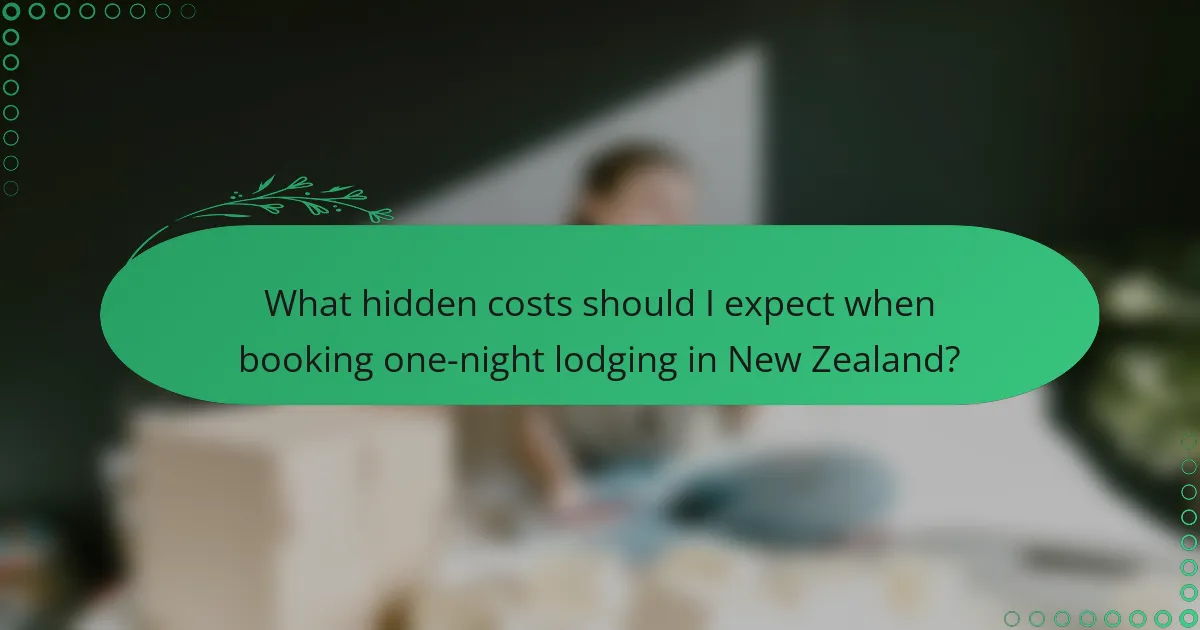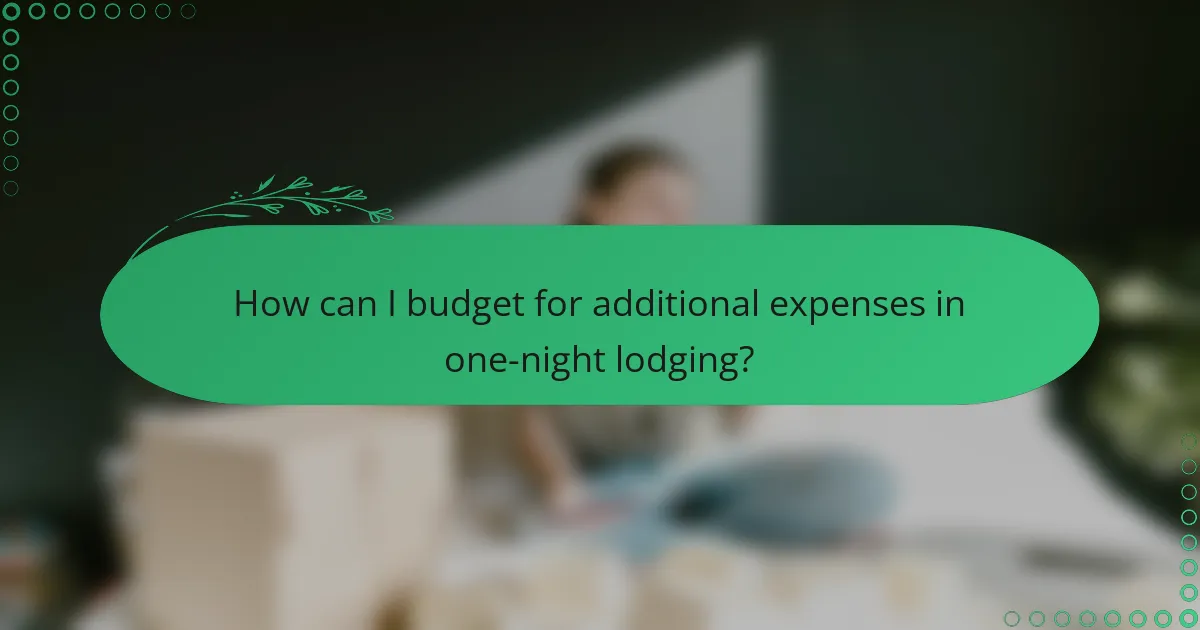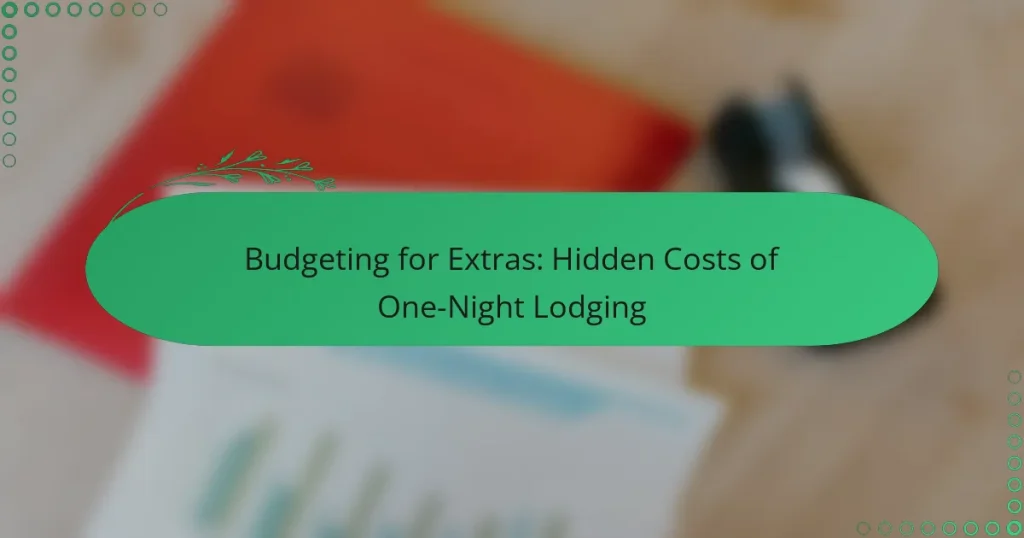When planning a one-night stay in New Zealand, it’s crucial to account for hidden costs that can inflate your budget. Beyond the advertised room rate, expenses such as cleaning fees, local taxes, and parking charges can quickly add up, often catching travelers off guard. To ensure a smooth trip, take the time to identify and budget for these additional costs ahead of time.

What hidden costs should I expect when booking one-night lodging in New Zealand?
When booking one-night lodging in New Zealand, expect various hidden costs that can significantly increase your total expense. These may include cleaning fees, service charges, local taxes, parking fees, and resort fees, which are often not included in the initial price displayed online.
Cleaning fees
Cleaning fees are common in short-term rentals and can range from NZD 50 to NZD 150, depending on the property size and type. These fees cover the cost of cleaning the accommodation after your stay. Always check if this fee is included in the quoted price or added later, as it can affect your budget.
Service charges
Service charges are additional fees that platforms or property owners may impose for managing bookings. These charges can vary widely, often between 5% to 15% of the total booking cost. Be sure to read the fine print to understand how much you will be charged and for what services.
Local taxes
In New Zealand, local taxes such as the Goods and Services Tax (GST) of 15% are typically included in the advertised price, but some accommodations may add additional local levies. Always confirm whether taxes are included in the total cost to avoid surprises at checkout.
Parking fees
If you plan to drive, consider potential parking fees, which can range from NZD 10 to NZD 30 per night in urban areas. Some accommodations offer free parking, while others may charge for on-site parking or nearby public lots. Check the lodging’s parking policy to budget accordingly.
Resort fees
Resort fees are often charged by hotels and can cover amenities like Wi-Fi, pool access, or gym facilities. These fees can range from NZD 20 to NZD 50 per night. Make sure to inquire about any resort fees when booking to ensure you understand the total cost of your stay.

How can I budget for additional expenses in one-night lodging?
To budget for additional expenses in one-night lodging, consider all potential costs beyond the room rate. This includes taxes, fees, and any extras like parking or meals that can quickly add up.
Itemize potential costs
Start by listing all possible expenses associated with your one-night stay. Common costs include the room rate, local taxes, resort fees, and service charges. Additionally, consider parking fees, Wi-Fi charges, and any amenities you might use, such as the gym or pool.
For example, if you’re staying in a city, parking could range from $10 to $50 depending on the location. Meals can also vary widely; budgeting around $20 to $50 for food is a good starting point.
Use budgeting apps
Budgeting apps can help you track and manage your lodging expenses effectively. Look for apps that allow you to input estimated costs and compare them against your actual spending. This can provide valuable insights and help you stay within your budget.
Some popular budgeting apps include Mint, YNAB (You Need A Budget), and PocketGuard. These tools often allow you to set alerts for when you’re approaching your budget limits, helping you avoid overspending.
Research before booking
Before finalizing your lodging, research different options to understand the full cost. Check the hotel’s website for hidden fees and read reviews to see if other guests mention unexpected charges. This can help you make an informed decision and avoid surprises.
Additionally, compare prices across multiple booking platforms. Sometimes, direct bookings offer better rates or perks, such as free breakfast or waived fees, which can significantly affect your overall budget.

What are the common pitfalls in one-night lodging budgeting?
Common pitfalls in one-night lodging budgeting include overlooking additional fees and underestimating food expenses. These hidden costs can significantly impact your overall budget, making it essential to plan for them in advance.
Ignoring extra guest fees
Many accommodations charge extra fees for additional guests beyond a specified limit. These fees can range from a nominal amount to a significant percentage of the room rate, depending on the property.
To avoid surprises, always check the accommodation’s policy on guest limits and associated fees before booking. For instance, a hotel may charge an extra $20 to $50 per person per night, which can quickly add up.
Underestimating food costs
Food expenses can escalate quickly when staying in a hotel, especially if you plan to dine out for every meal. Budgeting for meals can be tricky, as prices vary widely based on location and dining choices.
Consider setting aside a daily food budget of around $30 to $70 per person for meals, depending on whether you opt for casual dining or fine dining. Additionally, check if your lodging includes breakfast, which can help reduce overall food costs.
Not accounting for late check-out fees
Late check-out fees can catch travelers off guard, especially if plans change unexpectedly. Many hotels charge a fee for extending your stay beyond the standard check-out time, which can range from $25 to half the nightly rate.
To avoid these charges, confirm the check-out policy when booking and plan your departure accordingly. If you anticipate needing extra time, inquire about the possibility of a late check-out at the time of booking to avoid additional costs.

How do I compare lodging options effectively?
To compare lodging options effectively, focus on key factors such as price, amenities, and additional fees. A thorough evaluation helps you identify the best value for your stay while avoiding unexpected costs.
Use comparison websites
Comparison websites aggregate lodging options, allowing you to view prices and features side by side. Popular sites like Booking.com and Expedia can help you filter results based on your preferences, such as location, price range, and amenities.
When using these platforms, pay attention to the sorting options. Look for filters that highlight total costs, including taxes and fees, to get a clearer picture of what you’ll actually pay.
Read reviews on hidden fees
Customer reviews can reveal hidden fees that may not be immediately apparent in the listing. Look for comments regarding additional charges such as resort fees, parking fees, or cleaning fees that can significantly increase your total cost.
Websites like TripAdvisor often feature user experiences that mention these extra costs. Prioritize reviews that specifically mention the financial aspects of the stay to make informed decisions.
Check cancellation policies
Cancellation policies vary widely among lodging options and can impact your overall budget. Some places offer flexible cancellation, while others may impose strict penalties for changes or cancellations.
Before booking, read the cancellation terms carefully. Look for options that allow free cancellation up to a certain date, which can provide peace of mind if your plans change unexpectedly.

What are the best practices for finding affordable one-night lodging?
To find affordable one-night lodging, start by planning ahead and exploring various options. Being flexible with your travel dates and considering different types of accommodations can significantly reduce costs.
Book in advance
Booking your lodging well in advance is one of the most effective ways to secure lower rates. Many hotels and rental services offer discounts for early reservations, often saving you a significant amount compared to last-minute bookings.
As a general rule, aim to book at least a few weeks ahead, especially during peak travel seasons. This approach not only helps in locking in better prices but also gives you a wider selection of available options.
Look for promotional deals
Promotional deals can provide substantial savings on one-night stays. Keep an eye out for seasonal discounts, loyalty program offers, and flash sales that hotels or booking platforms may advertise.
Utilizing websites that aggregate deals can help you compare prices across multiple platforms. Signing up for newsletters from hotels or travel sites can also alert you to exclusive offers that may not be widely advertised.
Consider alternative accommodations
Exploring alternative accommodations can lead to more affordable lodging options. Consider staying at hostels, guesthouses, or vacation rentals, which often provide competitive rates compared to traditional hotels.
Additionally, platforms like Airbnb or Couchsurfing can connect you with unique lodging experiences that may be more budget-friendly. Always read reviews and check the location to ensure safety and convenience during your stay.


